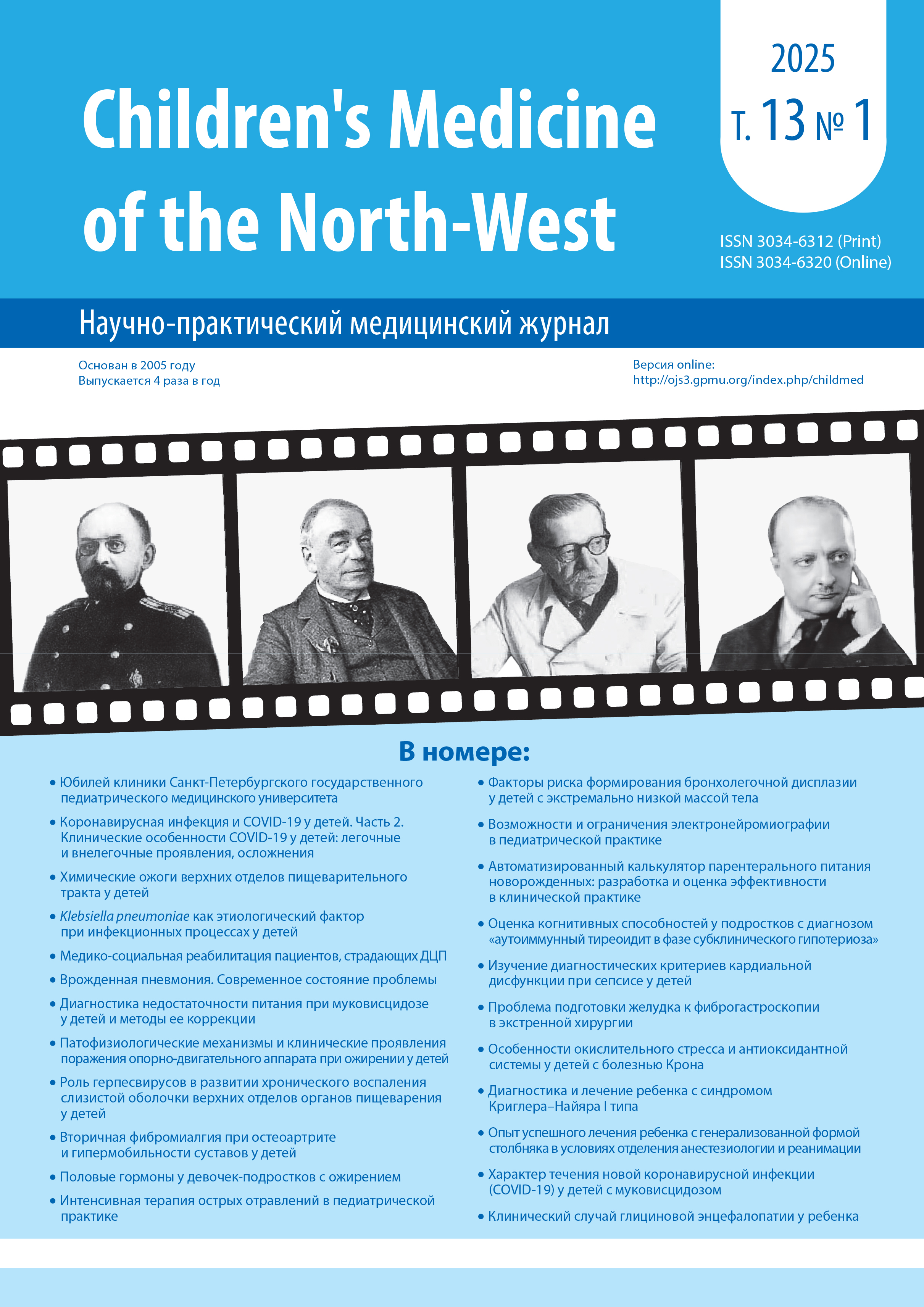AUTOMATED CALCULATOR FOR PARENTERAL NUTRITION IN NEWBORNS: DEVELOPMENT AND EVALUATION OF EFFECTIVENESS IN CLINICAL PRACTICE
Abstract
Introduction. Planning and calculating adequate nutritional support to meet the metabolic needs of newborns with varying gestational ages is an essential daily task for a resuscitator in the neonatal intensive care unit. This process is time-consuming, requiring the physician’s practical knowledge, skills, and expertise, and is associated with the risk of potentially fatal errors. Purposes. To optimize the methodology for calculating parenteral nutrition in the practice of resuscitators using a parenteral nutrition calculator (PNC) for newborns with different gestational ages. Materials and methods. Data from global literature on the use and implementation of PNC in various clinics worldwide were analyzed. Based on the results from international literature and Russian recommendations on neonatal parenteral nutrition, a proprietary PNC prototype was developed. The automated calculator was tested in two groups of resuscitators in the neonatal intensive care unit (NICU) with varying levels of experience. Results and discussion. The developed PNC successfully underwent clinical trials in the NICU and demonstrated high levels of physician satisfaction with its use. In the group of physicians with over 4 years of experience, the average time spent completing one clinical case scenario (CCS) using the PNC was 2 minutes 4 seconds, compared to 4 minutes 31 seconds without the PNC. In the group of physicians with less than 4 years of experience, the differences were even more pronounced: 2 minutes 5 seconds with the PNC, compared to 6 minutes 10 seconds without it. Conclusions. The developed PNC demonstrates a real opportunity to optimize PN calculations, reduce the time burden on physicians, and minimize errors. Future studies should analyze the impact of the PNC on reducing clinical errors and explore the possibility of integrating it into electronic medical records to further standardize and improve neonatal care practices.
References
Alghamdi A.A., Keers R.N., Sutherland A., Ashcroft D.M. Prevalence and Nature of Medication Errors and Preventable Adverse Drug Events in Paediatric and Neonatal Intensive Care Settings: A Systematic Review. Drug Saf. 2019;42(12):1423–36.
Ochoa-Sangrador C., Brezmes-Valdivieso M.F, Gil-Valino C., Pediatric Parenteral Nutrition Mixtures Design Program: Validity and Stability Study, Comput Biomed Res. 1995;28:271–281.
Picart D., Guillois B., Nevo L., Alix D. A Program for Parenteral and Combined Parenteral and Enteral Nutrition of Neonates and Children in an Intensive Care Unit, Intensive Care Med. 1989;15:179–18.
Gnigler M., Schlenz B., Kiechl-Kohlendorfer U., Rüdiger M., Navarro-Psihas S. Improved weight gain in very-low-birth-weight infants after the introduction of a self-created computer calculation program for individualized parenteral nutrition. Pediatr Neonatol. 2014;55(1):41–7. DOI: 10.1016/j.pedneo.2013.05.010.
Horn W., Popow C., Miksch S., Kirchner L., Seyfang A. Development and evaluation of VIE-PNN, a knowledge-based system for calculating the parenteral nutrition of newborn infants. Artif Intell Med. 2002;24(3):217–28. DOI: 10.1016/s0933-3657(01)00105-1.
Huston R.K., Markell A.M., McCulley E.A., Marcus M.J., Cohen H.S. Computer programming: quality and safety for neonatal parenteral nutrition orders. Nutr Clin Pract. 2013;28(4):515–21. DOI: 10.1177/0884533613490741.
Lehmann C.U., Conner K.G., Cox J.M. Preventing provider errors: online total parenteral nutrition calculator. Pediatrics. 2004;113(4):748–53. DOI: 10.1542/peds.113.4.748.
Piert M., Kistler D., Hettich R. Computer-assisted Infusion and Nutrition Planning in an Intensive Care Burn Unit, Intensive Care Med. 1989;15:121–125.
Mulac A., Taxis K., Hagesaether E., Gerd Granas A. Severe and fatal medication errors in hospitals: findings from the Norwegian Incident Reporting System. European journal of hospital pharmacy : science and practice. 2021;28
(Suppl 2):e56–61.
Nguyen M.R., Mosel C., Grzeskowiak L.E. Interventions to reduce medication errors in neonatal care: a systematic review. Therapeutic advances in drug safety. 2018;9(2):123–155. DOI: 10.1177/2042098617748868.
Schloerb P.R. Electronic Parenteral and Enteral Nutrition. J Parenter Enteral Nutr. 2000;24:23–29.
Papandreou P., Ntountaniotis D., Skouroliakou M., Massara P., Siahanidou T. Does a parenteral nutrition decision support system for total nutrients improve prescription procedure and neonatal growth? J Matern Fetal Neonatal Med. 2021;34(5):747–754. DOI: 10.1080/14767058.2019.1615432.
Pawluk S., Jaam M., Hazi F., Al Hail M.S., El Kassem W., Khalifa H., Thomas B., Abdul Rouf P. A description of medication errors reported by pharmacists in a neonatal intensive care unit. Int J Clin Pharm. 2017;39(1):88–94.
Stavroudis T.A., Shore A.D., Morlock L., Hicks R.W., Bundy D., Miller M.R. NICU medication errors: identifying a risk profile for medication errors in the neonatal intensive care unit. J Perinatol: official journal of the California Perinatal Association. 2010;30(7):459–468. DOI: 10.1038/jp.2009.186.
Voskanyan Yu.E. Epidemiology of Medical Errors and Incidents in Emergency Medicine. Russian Sklifosovsky Journal “Emergency Medical Care”. 2022;11(2):301–316. DOI: 10.23934/2223-9022-2022-11-2-301-316.
Володин Н.Н. Парентеральное питание новорожденных. Клинические рекомендации. Российская ассоциация специалистов перинатальной медицины совместно с Ассоциацией неонатологов, Союз педиатров России. 2015.
Volodin N.N. Parenteral nutrition of newborns. Klinicheskiye rekomendatsii. Rossiyskaya assotsiatsiya spetsialistov perinatal’noy meditsiny sovmestno s Assotsiatsiyey neonatologov, Soyuz pediatrov Rossii. 2015. (In Russian).



